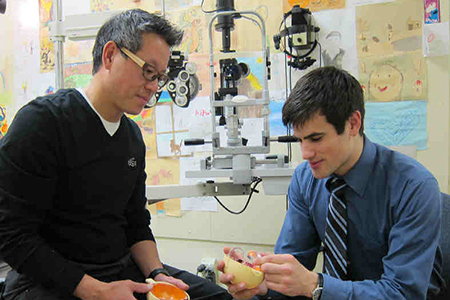In the last year or so, engineering careers have started to get some buzz as one of the fastest-growing, highest-paying and, dare we say, coolest industries around. With so many different paths to take at both the college and career level, every engineering field offers a chance to innovate, create, challenge your mind and pull in a serious salary in the process. According to the Bureau of Labor Statistics, engineers can make anywhere from an average of $57,850 (electrical engineering) to over $100,000 (aerospace, computer hardware, nuclear and petroleum engineering).*
WHERE CAN ENGINEERING TAKE YOU?
There are many different careers that open up with a degree in engineering, and a number of different majors are available for you to pursue. At Trine University (IN), you can study engineering disciplines such as biomedical, chemical, civil, computer, electrical and mechanical engineering. Each of these majors will lead to an array of career options.
VK Sharma, dean of the Allen School of Engineering at Trine University, recommends using YouTube to find videos on what different engineers actually do in the field, but he also makes clear that Trine “will admit students in general engineering to start off with. If students are strong in math and science but are uncertain on their particular passion, they can come as a general student and take general courses until they figure out their discipline.”
The post-graduate outlook after majoring in any engineering field looks bright. “Graduates take many different engineering positions at companies,” says Rich Rothaupt, associate dean of the College of Science, Technology, Engineering and Mathematics at the University of Wisconsin-Stout. “The most common concern I hear from employers is that they cannot find enough graduates with engineering degrees. The forecast, by all standards, is for strong demand for engineering graduates, which translates to many career opportunities for our graduates.”
Dean Frederick Driscoll of the Wentworth Institute of Technology (MA) agrees, and encourages students to take a long view of their career opportunities. “It is just incredible the impact that today’s students will have on the 21st century. Your career could take you all the way to the year 2070. Just think about the impact you can have on the problems facing society: sustainability, communications, improving our urban centers and much more. Engineering gives today’s students a chance to become global citizens who will affect how people live in the U.S. and across the world.”
BUILDING YOUR FOUNDATION NOW
It will come as no surprise to learn that excellent engineering candidates should have a serious track record of success in high school math and science courses. Sharma reminds students that engineering is about a willingness to “expand your intellectual horsepower more than anything else,” which means plenty of calculus-heavy courses to prepare you for the real work of solving problems using critical-thinking skills and mathematical language.
But don’t discount the importance of your other academics in favor of math and science. Deborah Bandy, director of marketing and student recruitment at Embry-Riddle Aeronautical University (FL and AZ), says, “Obviously, good language skills help in any field, and our students are required to have four years of high school English to be qualified for admission to the College of Engineering.”
BEYOND THE CLASSROOM
If you’re a solid student who thinks you might be interested in engineering, a great way to test the waters while helping to bolster your college application is by trying out an internship, summer enrichment program or job shadowing program to get a feel for what being an engineer is really like.
“We see a lot of students in high school activities with a STEM focus become interested in majoring in engineering,” notes Amy Arkwright, recruiting coordinator for the College of Engineering and Mines at the University of Alaska Fairbanks (UA). “Groups like math clubs, web design classes, technology courses and computer labs often open awareness and engagement at an earlier age. Robotics clubs are also a great approach for students to see how the concepts of engineering can be put to action in tangible and stimulating ways.”
“Students should also get involved with extracurricular activities such as Science Olympiad, High Mileage Vehicle and SkillsUSA,” adds Rothaupt. “Many of these contests let students experience engineering design and theory in a practical format.”
Internships, Enrichment and Program Options
So what lies ahead if you do decide to pursue engineering at the college level? Thanks to the major demand for engineering talent, more and more higher institutions are partnering with companies and researchers to create opportunities for hands-on engineering work that’s built right into your course load.
“All of our engineering programs at the University of Wisconsin-Stout require a student to complete an internship/co-op, which is a paid position at a participating company,” says Rothaupt. “Many students complete multiple co-ops to gain depth of experience at a company or to gain breadth by working for a different company or in a different industry. We have always had more companies posting co-op opportunities than there were students available.” In addition, the engineering students at UW-Stout complete a two-semester senior design sequence, which has a strong research component.
Meanwhile, at Embry-Riddle, engineering students are thrilled to be at “the only university in the country that has students competing in all five intercollegiate robotics competitions and also in NASA’s Lunabotics Mining competition,” says Bandy. “Also, we are among only 16 universities participating in EcoCAR3, sponsored by General Motors and the Environmental Protection Agency.” These initiatives have students working to solve real-world problems while getting to compete against (and network with) other students and professionals in the field.
Interested in an internship that’s truly off the beaten path? Arkwright notes, “Alaska’s vast terrain undeniably leads to many opportunities of diverse fieldwork. Students often have summer internships, for example, working out on the North Slope or shaping roads in rural areas.” Students at UA-Fairbanks can take advantage of Alaska’s unique climate to assemble data that they wouldn’t have access to elsewhere. They also get to intern with organizations like NASA and the National Science Foundation.
TOMORROW’S TRENDS
The diverse fields of engineering offer countless opportunities for talented, curious students. Says Sharma, “Nearly everything you touch or use has involved an engineer. When you brush your teeth, everything from the toothpaste cap to the flow of hot and cold water has required the work of an engineer. There are lots of openings to innovate right now. We need engineers to develop hybrid vehicles, to work on fuel cells and sustainable energy options like wind, water and solar. We need engineers to create a cleaner environment, lighter materials, improved highways, secure defense systems—really, your options as an engineer today are unlimited.”
Arkwright agrees, “Climate change and doing more with limited natural resources will be some of the overarching problems engineers will face in the future.”
And while new, creative ideas are needed to innovate solutions to problems like climate change and cybersecurity, engineers are also needed to maintain existing infrastructure and come up with creative ways to update and improve the systems that already run our daily lives. Says Bandy, “As the nation’s infrastructure decays, there is a tremendous need for engineers to bring new technologies to solve these emerging problems.”
KNOW YOUR OPTIONS AND GET ON TRACK
If you think engineering is for you, take the next step: visit schools and talk to the professors and students at each institution to get a sense for where your interests might best fit. Learn about the research students are working on, and identify whether or not you see room to explore the curiosities that drive you. If you have the skills and interest to become an engineer, you’ll not only help people improve their lives, but also earn some of the highest starting salaries of any college graduates.
*Source: Occupational Outlook Handbook, Bureau of Labor Statistics, January 2014.
Caitlin Corrigan is a freelance writer living in Portland, Maine.



